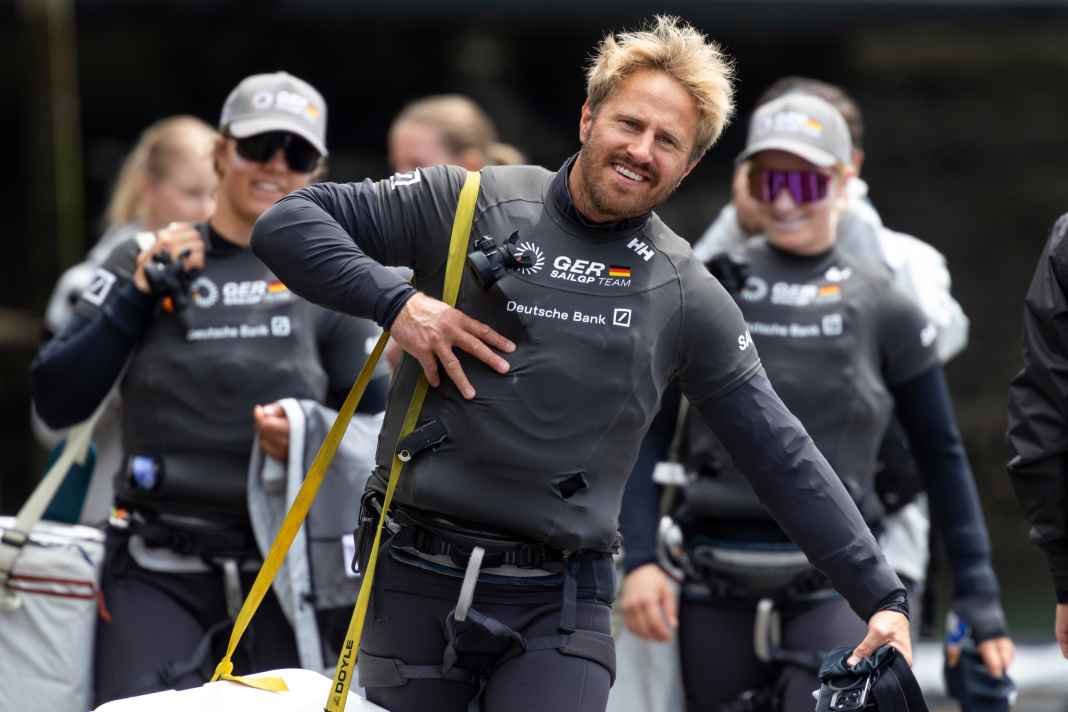





A wish for the first German SailGP in Sassnitz? Erik Kosegarten-Heil only has to think for a moment, then says: "If you could make a wish, it would be to put a real exclamation mark on the season in Sassnitz!" His team is just over halfway through the first half of the fifth SailGP season. It is only the second for the German racing team.
Team Germany hungry on course for Sassnitz
Despite much progress, they have felt the effects of this this year. Because there are hardly any training opportunities in the still relatively young Formula 1 of sailing, the step up to the upper echelons of the sport requires a lot of patience and the ability to take things in your stride.
Before the German premiere, the German SailGP team is in eleventh place out of twelve teams in the season rankings with zero points, because a whopping twelve penalty points from Sydney had to be deducted first. Behind them are the Americans, who would not have any more points on their SailGP account without the huge thunderstorm of penalty points for the Germans. Click here for the seasonal stands.
After finishing eleventh at the seventh of twelve SailGPs in Portsmouth, the German racing team of entrepreneur Thomas Riedel and four-time Formula 1 world champion Sebastian Vettel, in which Wacken Open Air founder Holger Hübner and e-sports expert and ESL founder Ralf Reichert have also invested and Deutsche Bank is on board as presenter and partner, wants to score points at the "home game" off the island of Rügen.
Black-red-gold focuses on the starts
They have intensively analysed the obvious starting weakness and the "worst starting average ever" of 8.9 in Portsmouth. The "winning average" on a race weekend is around 5.4. In addition to the flood of data available for the intensive team analyses, Erik Kosegarten-Heil has edited a video of all the starts of the entire season - from 2:30 before each start to one minute afterwards.
"Over the course of the last few races, we have put together more and more details to create a strong picture of what the start should look like," said Erik Kosegarten-Heil. However, at a certain point, the wealth of detail can also be "too much". "The better we are as a team, the less we talk to each other," says grinder Felix Van den Hövel, describing the direction of optimisation.
Simplification and automation processes continue to be an important goal. This is no easy task for newer teams, who are chasing the experience advantage, especially in teams from the early days, who are already in their fifth year on the F50 foils. The SailGP in Sassnitz offers a rare and welcome opportunity: the Germany SailGP Team - like three other teams - will be allowed to train on the boats for several days before the showdown on 16 and 17 August.
Not being able to train with a new team is wild. The training days in Sassnitz will help us." Erik Kosegarten-Heil
"We will have Brazil on the course from day one. We will be actively practising starts. From the second day, there will be four teams on the water. There is usually no training between events. You put everything together in theory. The training days in Sassnitz will be a great opportunity for us," says Erik Kosegarten-Heil, explaining the value of the training ahead.
The key to successful SailGP launches
The starts, usually of great importance in sailing and in the SailGP as a rule already decisive, can be organised in the same way as the French often do, explains the German driver: "They often come in early, sit on the boundary and then set off. But that's not the average fast start. The key is to keep the boat fast and stay on time. But you have to have some training for that..."
In short practice races before the Grand Prix summits, the German team has often looked very good in the starts. However, these warm-ups are usually only sailed with half fleets of six boats. "There's no comparison," Erik Kosegarten-Heil knows only too well. His outlook: "I've demanded of myself, and I've also heard it from a few others, that we simply focus on me having the leadership at the start. If I say "my boat", then nobody has anything to say. Of course, the onus is then on me to recognise and act on everything, but there's no other way."
Reducing communication on board even further from tight to minimal is part of the optimisation process on board. This also includes avoiding mistakes like the one in Portsmouth, when the tactically active grinder Will Tiller and Erik Kosegarten-Heil actually misunderstood each other purely verbally, resulting in a botched start.
Why the SailGP catch-up is so difficult
For Erik Kosegarten-Heil, whose career in dinghy classes and Olympic sailing has mostly been on the up, the setbacks he has had to overcome this season are new. He says: "Of course you put it into perspective. You know how much training you've had - or not. You know that you used to start catching up with 200 days of training a year. If you now try to do the same here, with a much more complex boat, with a much more complex structure, in 39 days a year, then you also realise: okay, you're not going to catch up any faster."
The helmsman's positive takeaway from the SailGP in Sassnitz is "that we were able to make up one boat from the mark in Portsmouth for the first time over the entire race series". Which teams does he expect to be particularly strong in Sassnitz? The two-time Olympic 49er bronze medallist says: "That will depend on the conditions. Before Portsmouth, I would have said Australia, Canada, Spain and Great Britain. With the T-Foils, they were the strongest first."
The SailGP challenge
Now, he says, New Zealand has won in Portsmouth and Switzerland has suddenly found itself in the final. Things are so close in the SailGP that you can be at the back of the pack in one race and make an exclamation mark in the next. This is exactly what Erik Kosegarten-Heil wants for the home race off Sassnitz on 16 and 17 August. Remaining tickets for the race weekend with stadium and XL grandstands on Europe's longest accessible outdoor pier on Germany's largest island are still available here.
The SailGP combination is probably the biggest sailing challenge that has ever existed." Erik Kosegarten-Heil
The German helmsman's motivation for the SailGP remains huge: "I just think competition is great. We've never had a bigger challenge than what we're pushing for here. With the conditions, the few training opportunities, with the top people from the world of sailing, with the top boats, it's probably the biggest challenge there is in sailing."
That was Portsmouth! A look back at the first European race weekend of the fifth SailGP season and great insights into the German team behind and in front of the scenes before the action continues in Sassnitz on 16 and 17 August:

Tatjana Pokorny
Sports reporter
Tatjana “tati” Pokorny is the author of nine books. As a reporter for Europe's leading sailing magazine YACHT, she also works as a correspondent for the German Press Agency (DPA), the Hamburger Abendblatt and other national and international media. In summer 2024, Tatjana will be reporting from Marseille on her ninth consecutive Olympic Games. Other core topics have been the America's Cup since 1992, the Ocean Race since 1993, the Vendée Globe and other national and international regattas and their protagonists. Favorite discipline: Portraits of and interviews with sailing personalities. When she started out in sports journalism, she was still intensively involved with basketball and other sports, but sailing quickly became her main focus. The reason? The declared optimist says: “There is no other sport like it, no other sport with such interesting and intelligent personalities, no other sport so diverse, no other sport so full of energy, strength and ideas. Sailing is like a constantly refreshing declaration of love for life."

